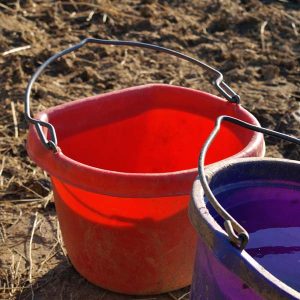
Is There Such a Thing As “Too Much of a Good Thing” When It Comes to Supplements?
I was helping with chores at the barn where I board my horse, and I was overwhelmed at the number of supplements some horses receive in their meals. Several of these horses are amazing athletes, and I wondered if all of these powders and pellets were truly necessary. Is there such a thing as “too much of a good thing” when it comes to supplements?
Concerns surrounding oversupplementation have been brewing among members of the equine-nutrition community for quite some time. The accessibility of over-the-counter supplements makes it incredibly easy for horse owners to concoct a ration that may be entirely inappropriate for the horse for which it is intended.
Those at fault, however, are not intentionally trying to hurt their horses. In fact, these horse owners are invariably trying to give their charges every possible nutritional or health advantage
Many of the supplements in the marketplace are quite useful. Who can dispute the utility of energy supplements? They are perfect for horses that require more calories than a normal diet can provide. Likewise, who can find fault with a well-formulated hoof supplement? Scientific evidence has proven that 20 mg of biotin per day increases hoof quality in many horses with crumbly, cracked hooves, and anecdotal evidence from horse owners and farriers is just as strong.
High-quality supplements that have been created and recommended by nutritionists and veterinarians for certain problems are often instrumental in keeping some horses healthy and competitive. Supplementation in these instances is indisputably warranted and encouraged. It is, however, the overuse of supplements in normal or otherwise well-fed horses that has become a point of concern.
Allow me to use vitamin and mineral supplementation as an example. There are a multitude of vitamin and mineral supplements on the market from which to choose; every tack or feed store stocks several brands and the mail-order catalogs and online stores offer many more. A vitamin and mineral supplement is appropriate for thousands of horses that are given a straight cereal grain such as oats or a mixture of cereal grains (oats, corn, and barley). In these instances, the supplement provides important vitamins and minerals. Such a supplement is also a sound nutritional choice for a horse that maintains his weight easily on an all-forage diet.
On the contrary, these supplements are generally not appropriate for horses that are receiving the recommended daily amount of a fortified concentrate (sweet or pelleted feed). If you’re feeding a mature horse in moderate work (which is how many event horses would be classified) a fully fortified concentrate formulated by a reputable company, he is getting all of the basic vitamins and minerals he requires. An all-purpose vitamin and mineral supplement would therefore do him no good. This is not to say the horse may not benefit from supplementation of a specific vitamin (equine athletes are often prone to muscle problems and natural vitamin E could help with this), but supplementation with an all-purpose product is probably not helpful to the horse and may even be harmful to him.
Some companies advertise “all-in-one” products that are presented as cure-alls for many common problems. These should be approached with a healthy dose of skepticism, because many times these products do not contain sufficient quantities of the touted ingredients to make a significant impact on health.
Nutritional supplements are appropriate for certain horses with specific needs. If you are unsure whether a horse needs supplementation, it’s best to consult a nutritionist and a veterinarian for guidance.



1 Comment
Pingback
[…] From the KPP Blog: […]